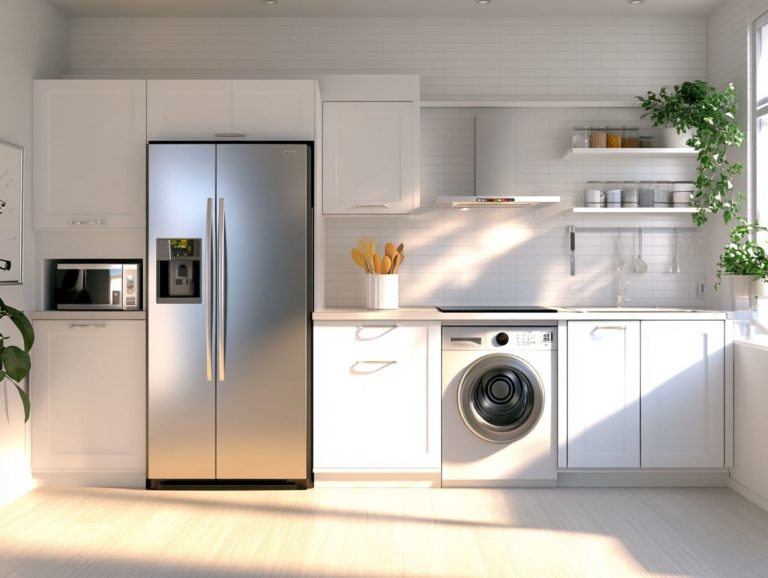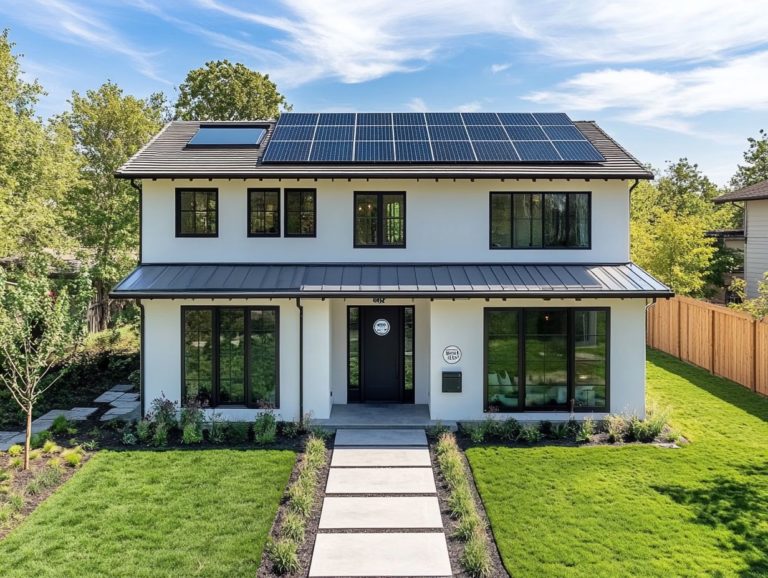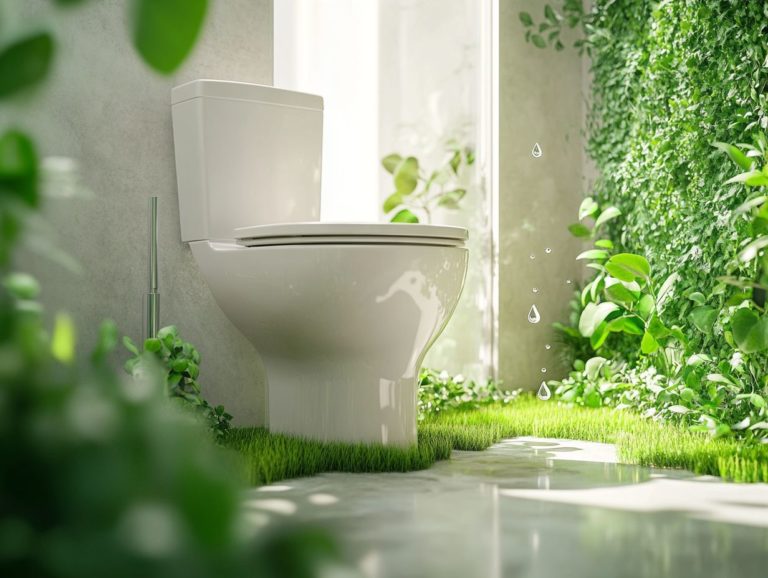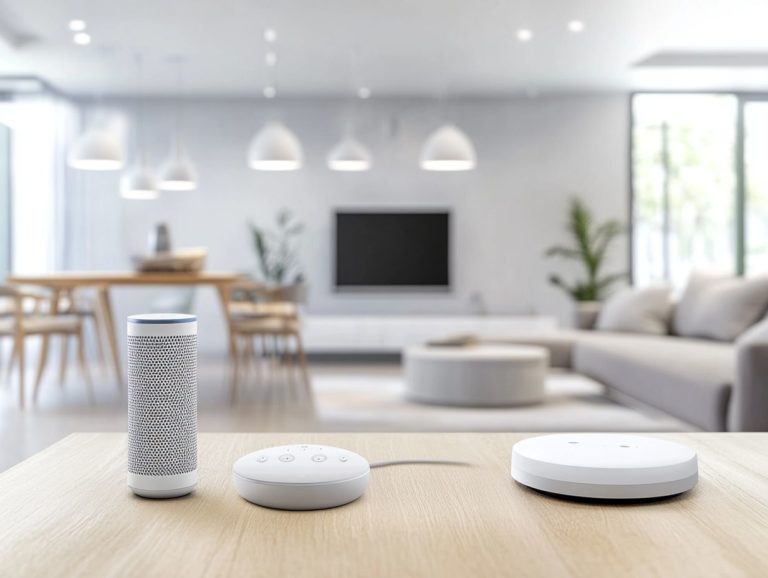What are Common Questions about Smart Homes?
Smart homes are revolutionizing the way you live. Join the smart home revolution and transform your lifestyle today! They seamlessly integrate technology and convenience to foster a more efficient lifestyle.
With options ranging from smart lighting and thermostats to sophisticated security systems, the possibilities are truly limitless. This article delves into the myriad benefits of smart homes, exploring how they operate while addressing common inquiries about their cost, security, and compatibility.
Whether you’re just becoming acquainted with the concept or contemplating an upgrade, you ll discover valuable insights to enrich your understanding of this compelling trend.
Contents
- Key Takeaways:
- Benefits of Smart Homes
- How Do Smart Homes Work?
- Common Questions About Smart Homes
- What is the Cost of Smart Home Systems?
- How Secure are Smart Homes?
- Can Smart Homes Be Hacked?
- What Happens During a Power Outage?
- Do Smart Homes Increase Resale Value?
- What Types of Devices Can Be Connected to a Smart Home System?
- Are There Any Privacy Concerns with Smart Homes?
- Can Smart Homes Be Controlled Remotely?
- Do All Smart Home Devices Work Together?
- What is the Future of Smart Homes?
- Frequently Asked Questions
Key Takeaways:
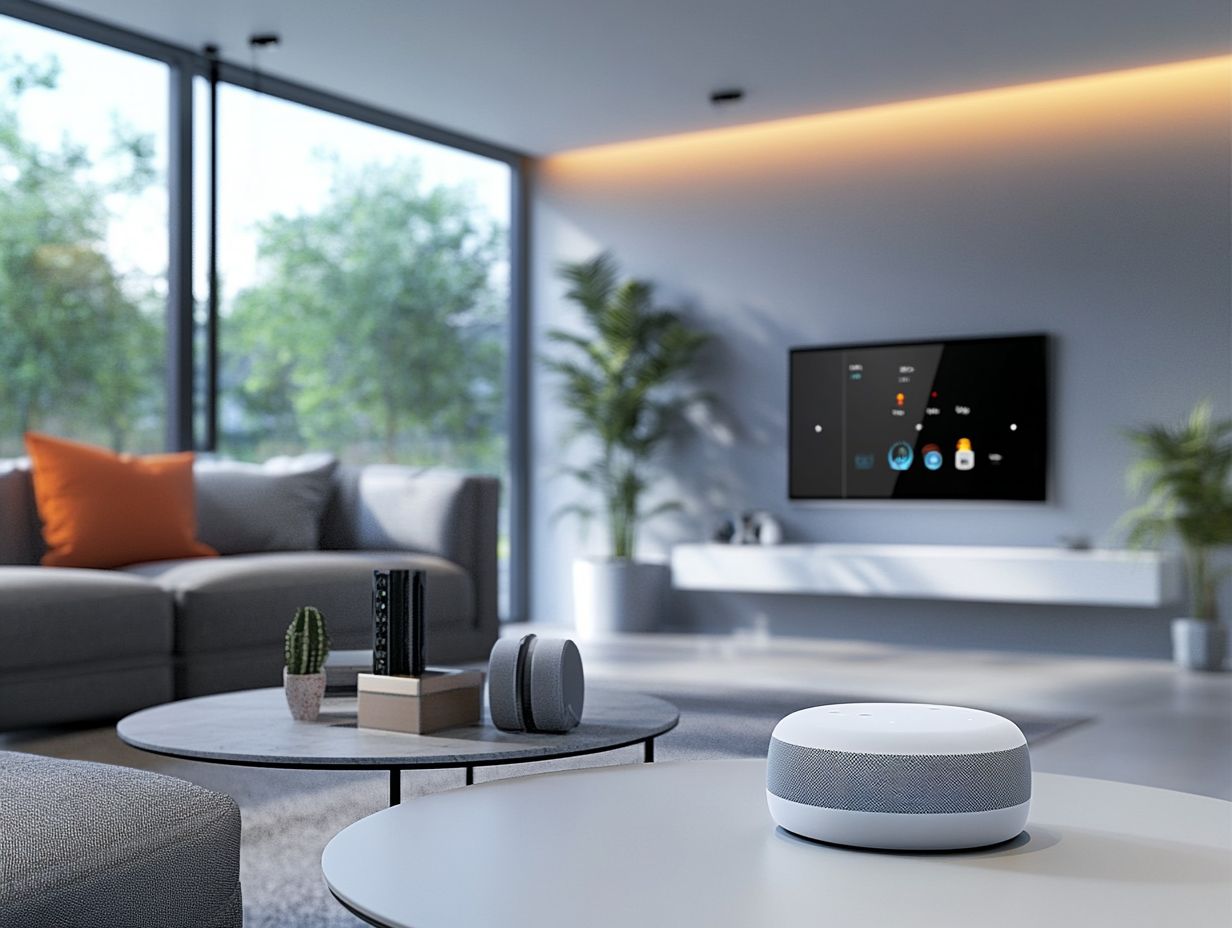
Smart home systems can range in price, but overall offer convenience and efficiency by automating tasks and increasing accessibility.
Smart homes can be vulnerable to hacking, but steps can be taken to ensure security and privacy.
The future of smart homes is constantly evolving, with new technologies and devices being integrated into systems to improve functionality and accessibility.
Defining Smart Homes
A smart home is a residence outfitted with an array of smart devices connected to the Internet. This setup allows you to control these devices remotely and automate various aspects of your living environment.
By utilizing the strength of Internet of Things (IoT) technology, your home facilitates seamless communication between different smart appliances. This creates an ecosystem where everything from lighting to climate control can be managed with just a few taps on your smartphone or through simple voice commands.
Typically, a smart home hub serves as your central command unit, ensuring that all devices, whether smart thermostats, security cameras, or even smart refrigerators, operate in harmony.
Compatibility among devices from various manufacturers has increasingly become the norm. This makes it easier for you to choose products that perfectly fit your needs while ensuring a high level of functionality throughout your automated living space.
Benefits of Smart Homes
The advantages of smart homes reach far beyond simple convenience. They present substantial energy savings, elevated security, and an enhanced quality of life.
With smart home technology at your fingertips, you can easily manage your devices through a mobile app or voice commands. This seamless integration of smart lighting, smart thermostats, and smart security systems amplifies your daily comfort and gives you the power to engage in proactive energy management while lowering utility costs.
The transformative impact of smart home applications is truly remarkable, reshaping how you live and interact with your environment.
Convenience and Efficiency
The true allure of smart homes lies in their remarkable convenience and efficiency, achieved through the seamless integration of various smart devices. You can control these devices remotely via mobile apps or voice commands.
This effortless control gives you the power to manage energy consumption, keep a watchful eye on your home security systems, and automate daily tasks. Ultimately, this elevates your living experience to a new level.
With smart plugs, smart bulbs, and smart thermostats at your fingertips, optimizing energy efficiency becomes a breeze. You can indulge in the modern conveniences that technology has to offer.
The advanced scheduling features allow you to designate specific times for your appliances to operate. This ensures that energy usage is kept to a minimum during peak hours.
Imagine having your smart oven pre-programmed to start cooking dinner just as your family arrives home, eliminating any unnecessary wait time. With an array of compatible devices, your smart appliances can communicate effortlessly with one another, creating a cohesive ecosystem that simplifies your daily routines.
Whether it’s adjusting the thermostat based on real-time weather updates or receiving instant alerts about home security directly on your smartphone, these smart home systems come together to provide you with unmatched convenience and peace of mind.
Ready to step into the future? Discover how smart homes can elevate your living experience!
How Do Smart Homes Work?
Smart Homes function through a sophisticated network of interconnected devices that seamlessly communicate with one another using advanced smart home technology. This creates a fully automated system designed to enhance convenience and energy efficiency.
Picture smart devices like thermostats, lighting, locks, and cameras all integrated into a centralized hub. You gain the ability to control your entire smart home network through a mobile app or voice commands via systems like Google Home and Alexa.
This level of integration not only amplifies functionality but also ensures device compatibility, making the setup and management process effortlessly straightforward for you.
Key Components and Technologies
The key components of Smart Homes encompass a range of innovative devices and technologies that seamlessly blend to create an efficient and convenient living environment.
At the heart of this system lies the smart home hub, the main device that connects all your smart gadgets. Think smart cameras, smart locks, smart thermostats, and smart bulbs enabling effortless communication and control.
Advanced technologies like machine learning and artificial intelligence elevate this experience, allowing for personalized automation and enhanced energy efficiency.
In this interconnected ecosystem, smart plugs give you the power to control appliances remotely. This simplifies energy consumption management, ensuring that devices are powered only when necessary.
Smart lights also offer customizable lighting options and bolster security by simulating occupancy when you re away.
With features like voice activation and mobile app control, these devices enhance your everyday convenience. They allow you to streamline your routines with ease.
By utilizing a single hub, all these devices can be programmed to work in perfect harmony. This delivers a truly integrated and responsive home environment that adapts to your preferences and routines.
Common Questions About Smart Homes
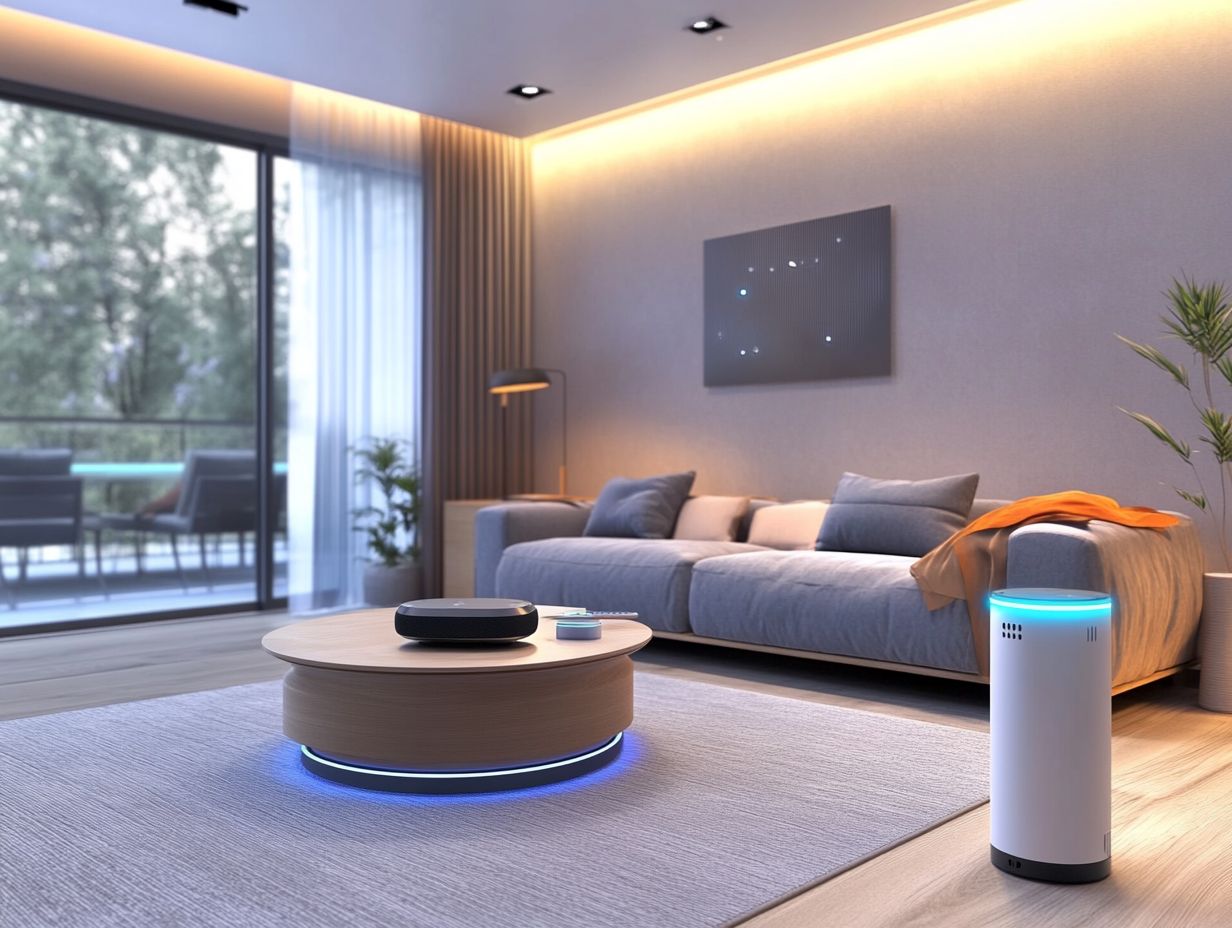
Questions about Smart Homes often center on key concerns like cost, security, and installation processes.
You might find yourself wondering about the overall expense of a smart home, the risks of hacking, and the measures you can implement to secure your smart home systems.
Grasping these elements is essential for anyone contemplating a smart home setup, as it gives you the power to make informed choices about smart devices and integration.
Ready to transform your living space? Let s dive into how to get started!
What is the Cost of Smart Home Systems?
The cost of Smart Home systems can vary widely depending on the array of devices you choose, their functionalities, and the installation requirements. For example, while smart bulbs and plugs may be relatively budget-friendly, a full-scale smart home installation featuring smart cameras, locks, and a hub can drive the costs upwards significantly.
Understanding this pricing landscape is crucial if you’re aiming to maximize your investment in smart home technology.
Start your smart home journey today with budget-friendly options! You can begin with simple devices priced between $10 and $50, making it accessible for many homeowners. If you re considering more advanced products, like high-quality security cameras or automated thermostats, expect to spend anywhere from $100 to $300.
Don t forget about professional installation services, which can add an additional layer of expense, typically ranging from $100 to $500 based on the complexity of your system.
If you re looking to integrate multiple smart home devices, you may want to budget closer to $1,000 or more, especially as you explore integrated systems that enhance overall functionality.
Ultimately, it s wise for you to plan carefully, weighing both the upfront costs and the potential long-term savings in energy and security.
Take control of your home’s future today!
How Secure are Smart Homes?
Smart home security is a growing concern for homeowners. Hacking and unauthorized access pose significant threats.
While many smart home systems like cameras and locks offer multiple layers of security, vulnerabilities can arise if necessary precautions are not taken. Understanding these security aspects is vital before integrating smart home technology into your living space.
To effectively protect interconnected devices, implementing robust security strategies is essential. This includes:
- Changing default passwords
- Enabling two-factor authentication, a method that requires a second verification step, adds extra security
- Regularly updating software to patch vulnerabilities
Consider segmenting your networks to isolate smart devices from sensitive personal data. Choosing reputable brands that prioritize security measures, like encryption and secure data storage, significantly reduces risks. By adopting these practices, you can create a safer environment while enjoying the conveniences of modern technology.
Can Smart Homes Be Hacked?
Smart homes can indeed be vulnerable to hacking, presenting significant risks if security measures aren’t adequate. Security breaches often stem from poorly secured smart devices.
It s crucial to grasp potential threats and take proactive steps to safeguard your systems. Keep up with software updates and use strong, unique passwords to bolster device security.
The interconnected nature of smart devices creates numerous entry points for malicious actors, who often exploit default passwords and the absence of encryption. You must segment your networks to protect your smart devices from threats!
Implementing two-factor authentication adds an extra layer of security, making it more challenging for cybercriminals to infiltrate your systems. Regularly review device permissions and the data shared with third-party applications to spot potential vulnerabilities before they become issues.
Setting up alerts for unusual activity helps maintain vigilance against threats, ensuring your automated environment remains protected from potential breaches.
What Happens During a Power Outage?
During a power outage, the reliability of your smart home systems can suffer, especially for devices that depend on a continuous power supply. While many smart devices, such as thermostats and cameras, come equipped with battery backups, others may stop working until power is restored.
Understanding how your smart home setup reacts during these events is essential for maintaining both security and comfort. To keep your smart home operational during interruptions, take proactive steps.
Consider investing in an uninterruptible power supply (UPS) to ensure that essential devices keep running, which allows for basic functionalities like security monitoring and temperature control. Familiarizing yourself with your devices’ specific backup capabilities is crucial, as some may have limited battery life.
Preparing an emergency plan that includes manual operation options and alternative communication methods like using a smartphone that connects via cellular networks can significantly boost the resilience and reliability of your smart home systems during unexpected power outages.
Do Smart Homes Increase Resale Value?
Investing in smart home technology can significantly boost the resale value of your property, making it appealing to tech-savvy homebuyers. Features like smart security systems, energy-efficient devices, and automated controls enhance your home s allure and marketability.
Wondering if smart homes can increase your home’s value? They can! Studies show that smart homes can increase market value by up to 5%. A 2022 case study demonstrated that properties with integrated smart home systems sold 30% faster than traditional homes.
Buyers today increasingly focus on energy efficiency; reports indicate that 74% of millennials are willing to pay a premium for homes outfitted with smart features. As this trend continues to gain momentum, you can enjoy immediate benefits of comfort and convenience while positioning your property advantageously in an evolving real estate landscape.
What Types of Devices Can Be Connected to a Smart Home System?
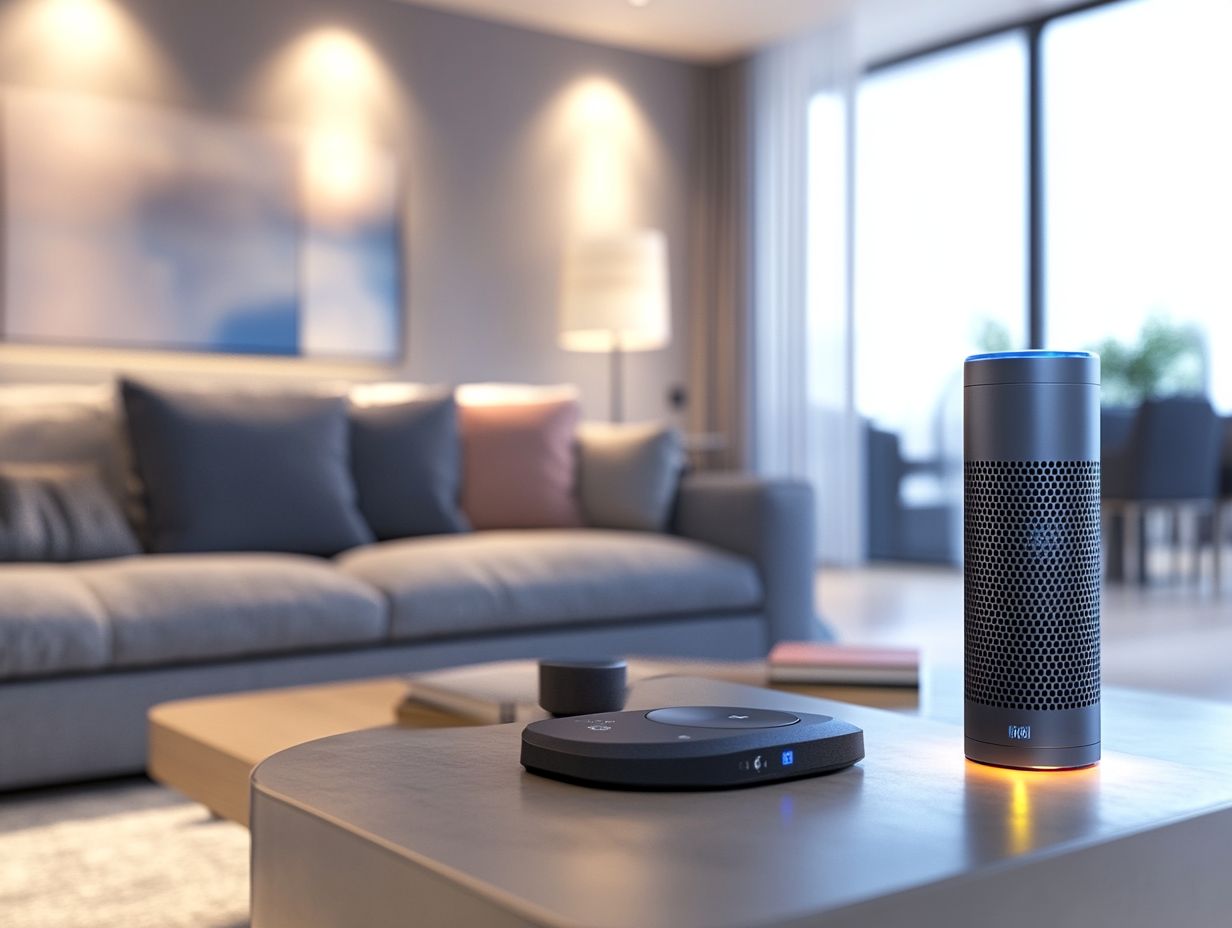
A wide array of devices can seamlessly connect to your Smart Home system, from smart lighting and plugs to appliances and security devices. This extensive compatibility gives you the power to craft a fully integrated smart home environment, allowing for effortless control and automation of your daily tasks.
Among the options available, smart thermostats can learn your individual preferences to optimize heating and cooling, delivering both comfort and energy savings.
Smart speakers act as centralized hubs where you can issue voice commands, effortlessly controlling various devices. Meanwhile, smart cameras enhance your security, providing real-time monitoring and alerts to keep your home safe.
You might also consider smart locks for added convenience and security, enabling keyless entry and remote access management.
Smart kitchen appliances, such as connected ovens and refrigerators, introduce innovative cooking and food management features, bringing advanced technology right into your culinary routine.
Embracing smart home integration cultivates an environment tailored for efficiency, convenience, and an elevated lifestyle.
Are There Any Privacy Concerns with Smart Homes?
Privacy concerns are a hot topic regarding Smart Homes. This is especially true for data security and the risk of unauthorized access to your personal information.
As smart devices gather data to enhance their performance, it s important to stay informed about how your information is utilized and the steps you can take to safeguard your privacy.
Consider this: smart speakers, thermostats, and security cameras collect details about your daily routines. This constant data collection can expose you to vulnerabilities, particularly in the event of a data breach or when third-party companies access your personal information without your consent.
To mitigate these risks, you should implement strong passwords and regularly update your device software. Additionally, carefully check your privacy settings.
- You might also want to invest in network security tools that protect your Wi-Fi from hackers, providing an extra layer of protection against potential threats.
By proactively understanding and applying these practices, you can enjoy the conveniences of a smart home while maintaining greater control over your private information.
Can Smart Homes Be Controlled Remotely?
Imagine controlling your Smart Home from anywhere! You can manage your devices with just a tap or a voice command, enabling you to monitor security systems, adjust lighting, and manage energy consumption even while you’re away.
Understanding how to harness these remote features is crucial for maximizing the functionality of your smart home. By integrating a smart home network, you can experience unparalleled convenience and peace of mind.
Imagine receiving real-time alerts on your smartphone about any unusual activity, keeping your property secure at all times. With voice control systems, setting the perfect ambiance becomes effortless; you can adjust the thermostat or dim the lights without lifting a finger.
This seamless interaction elevates your comfort and excitement for modern living, transforming everyday routines into effortless tasks that exemplify modern living.
Do All Smart Home Devices Work Together?
Not all smart home devices play nicely together. This can significantly affect the efficiency of your smart home system.
With compatibility varying across brands and technologies, you must ensure that your chosen smart devices can seamlessly integrate. This connection is key to a fully functional smart home experience.
In a world increasingly driven by technology, the joys of home automation can quickly morph into frustration if your devices can’t communicate effectively. Picture this: your smart thermostat refuses to sync with your lighting systems due to incompatible protocols.
This situation leaves you unable to optimize energy consumption. Not only does this disrupt your convenience, but it could also lead to higher energy costs.
To navigate these challenges, actively seek ecosystems built around universal standards like Zigbee or Z-Wave. These standards help mitigate integration issues by allowing diverse smart devices to interact smoothly.
By choosing compatible devices, you elevate your smart home s functionality. This ensures an integrated and harmonious living environment that enhances your everyday life.
What is the Future of Smart Homes?
The future of smart homes is thrilling and full of possibilities, propelled by emerging trends and technological advancements that are continually transforming the smart home market.
As these innovations unfold, you ll witness a remarkable shift in how daily tasks are automated. Environments will intuitively respond to your personal preferences.
With advanced voice recognition systems and intelligent personal assistants, managing your household functions will become more efficient and uniquely tailored to you.
The rise of smart security systems and energy-efficient devices enhances your safety while promoting a more sustainable lifestyle.
By keeping a watchful eye on these evolving technologies, you can adapt and fully leverage the potential of your smart living spaces. This ensures you enjoy all the advantages of a connected home.
Frequently Asked Questions
Here are some common questions people ask about smart homes:
What are Common Questions about Smart Homes?
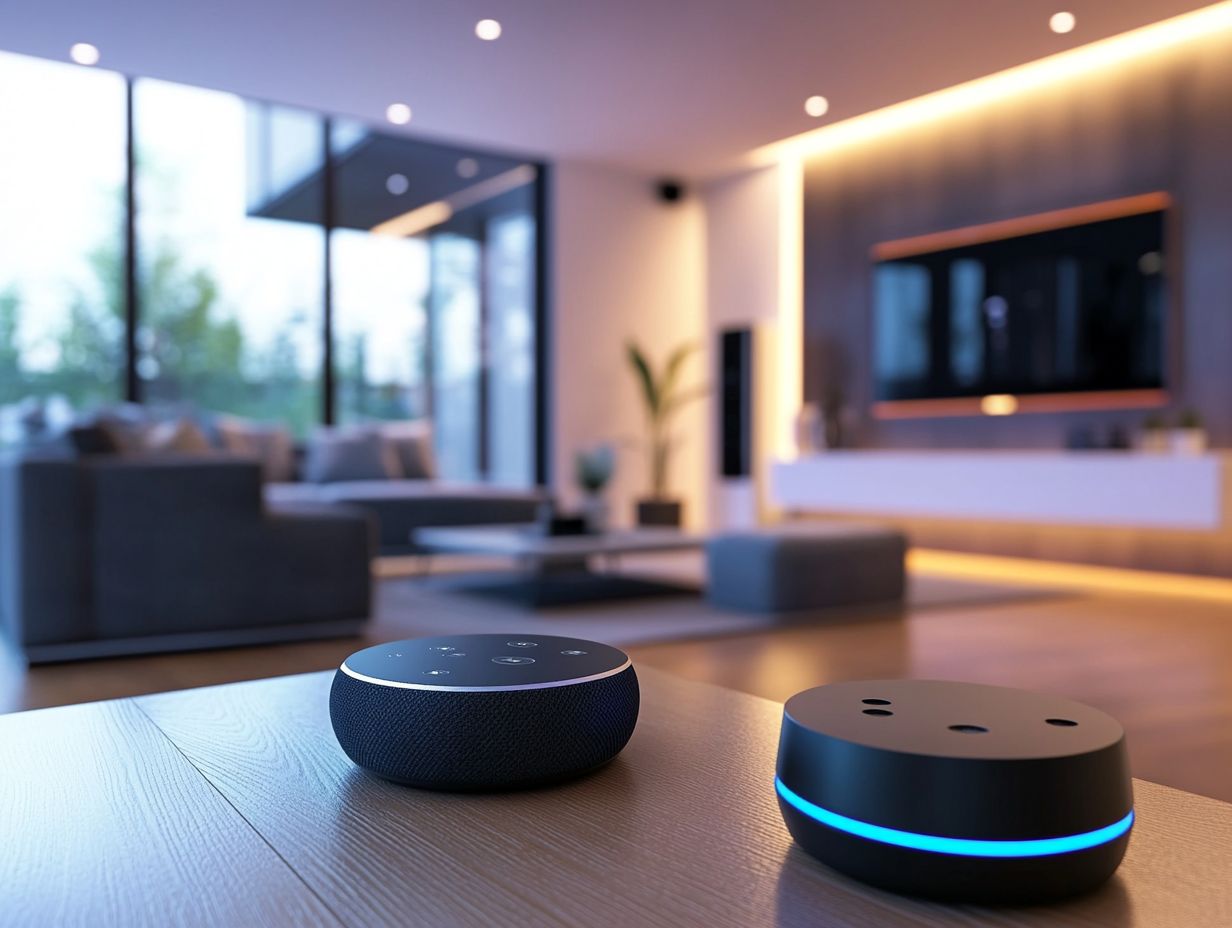
What is a smart home?
A smart home is a home equipped with devices, appliances, and systems that you can control and automate through internet-connected devices such as smartphones, tablets, or voice assistants.
What are the benefits of a smart home?
Some benefits of a smart home include increased convenience, energy efficiency, safety, and security. It can also save you time and money by automating tasks and reducing energy consumption.
Do I need to hire a professional to set up a smart home?
It depends on your level of technical expertise and the complexity of the smart home system you want to install. Some devices are easy to install and can be set up by you, while others may require professional installation.
Can I control my smart home when I’m away?
Yes, one of the main advantages of a smart home is that you can control and monitor it remotely through a mobile app or web interface. As long as you have an internet connection, you can access and control your smart home from anywhere in the world.
Are smart homes secure?
Smart homes use advanced security protocols and encryption to protect your home and data from cyber attacks. However, you should follow security best practices, such as using strong passwords and keeping your devices and software up to date, to ensure the security of your smart home.
How much does it cost to make a home smart?
The cost of making a home smart varies based on the devices and systems you choose, the size of your home, and whether you hire a professional for installation. On average, a basic smart home setup can cost anywhere from a few hundred to a few thousand dollars.
Explore smart home solutions today to enhance your living experience!


